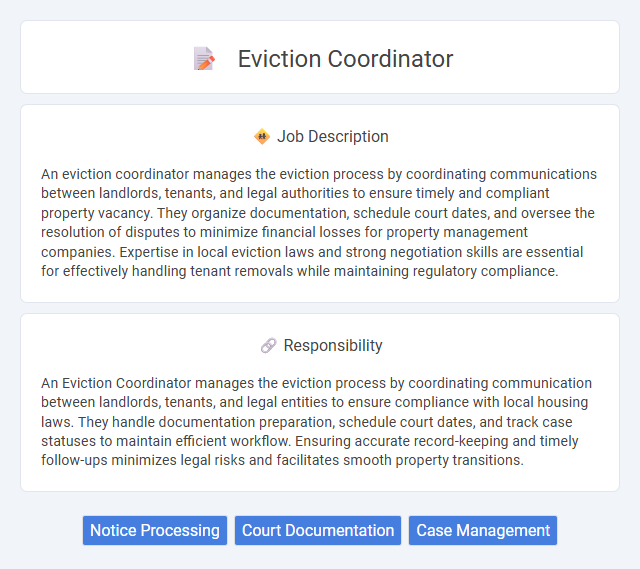
An eviction coordinator manages the eviction process by coordinating communications between landlords, tenants, and legal authorities to ensure timely and compliant property vacancy. They organize documentation, schedule court dates, and oversee the resolution of disputes to minimize financial losses for property management companies. Expertise in local eviction laws and strong negotiation skills are essential for effectively handling tenant removals while maintaining regulatory compliance.
Individuals who are calm under pressure and possess strong organizational skills are likely suitable for an eviction coordinator role, as the job often involves managing tense situations and coordinating multiple parties. Those who demonstrate empathy but can maintain professional boundaries might handle the emotional aspects of eviction processes effectively. Conversely, people prone to high stress or conflict avoidance may find this position challenging and less fitting for their temperament.
Qualification
An eviction coordinator must possess strong knowledge of landlord-tenant laws, excellent organizational skills, and experience in managing eviction processes from notice delivery to court filings. Proficiency in communication and negotiation with tenants and legal teams is essential to ensure compliance and resolve disputes efficiently. A background in property management or legal administration, combined with attention to detail and the ability to handle sensitive situations, is crucial for this role.
Responsibility
An Eviction Coordinator manages the eviction process by coordinating communication between landlords, tenants, and legal entities to ensure compliance with local housing laws. They handle documentation preparation, schedule court dates, and track case statuses to maintain efficient workflow. Ensuring accurate record-keeping and timely follow-ups minimizes legal risks and facilitates smooth property transitions.
Benefit
Eviction coordinators likely improve the efficiency of the eviction process, reducing delays and legal complications for property managers. Their expertise in handling documentation and communication may help minimize financial losses due to unpaid rent. Having a dedicated eviction coordinator probably enhances tenant relations by ensuring clear, consistent communication throughout the eviction proceedings.
Challenge
The role of an eviction coordinator likely involves managing complex legal processes and coordinating with multiple parties under tight deadlines, which may present significant challenges. Navigating varying state and local eviction laws could require strong attention to detail and adaptability. Dealing with potentially high-stress situations and emotional tenants might also add difficulty to maintaining thorough, professional communication.
Career Advancement
Eviction coordinators play a critical role in managing the eviction process, ensuring compliance with legal standards, and maintaining accurate documentation. Career advancement in this field often leads to roles such as property manager, leasing manager, or legal compliance specialist, where deeper expertise in tenant relations and real estate law is required. Mastery of eviction coordination enhances opportunities for leadership positions in property management firms, real estate companies, and legal departments.
Key Terms
Notice Processing
An Eviction Coordinator specializing in Notice Processing manages the timely issuance and documentation of eviction notices to tenants, ensuring compliance with local and state regulations. They track critical deadlines, verify tenant information, and maintain detailed records to support legal proceedings if necessary. Expertise in legal terminology and communication with property managers and legal teams is essential to streamline the eviction process and reduce potential disputes.
Court Documentation
Eviction coordinators specialize in managing court documentation essential for eviction proceedings, ensuring all legal paperwork complies with local regulations and deadlines. Their responsibilities include preparing summons, notices, and filing court forms to support landlords throughout the eviction process. Accurate handling of court documentation by eviction coordinators minimizes delays and legal risks during tenant removal cases.
Case Management
An Eviction Coordinator specializes in managing housing cases to ensure smooth eviction processes while complying with legal standards and tenant rights. They organize eviction documentation, coordinate court hearings, and communicate with landlords, tenants, and legal representatives to resolve disputes efficiently. Proficiency in case management software and knowledge of regional eviction laws enhance their ability to track caseloads and update stakeholders promptly.
 kuljobs.com
kuljobs.com